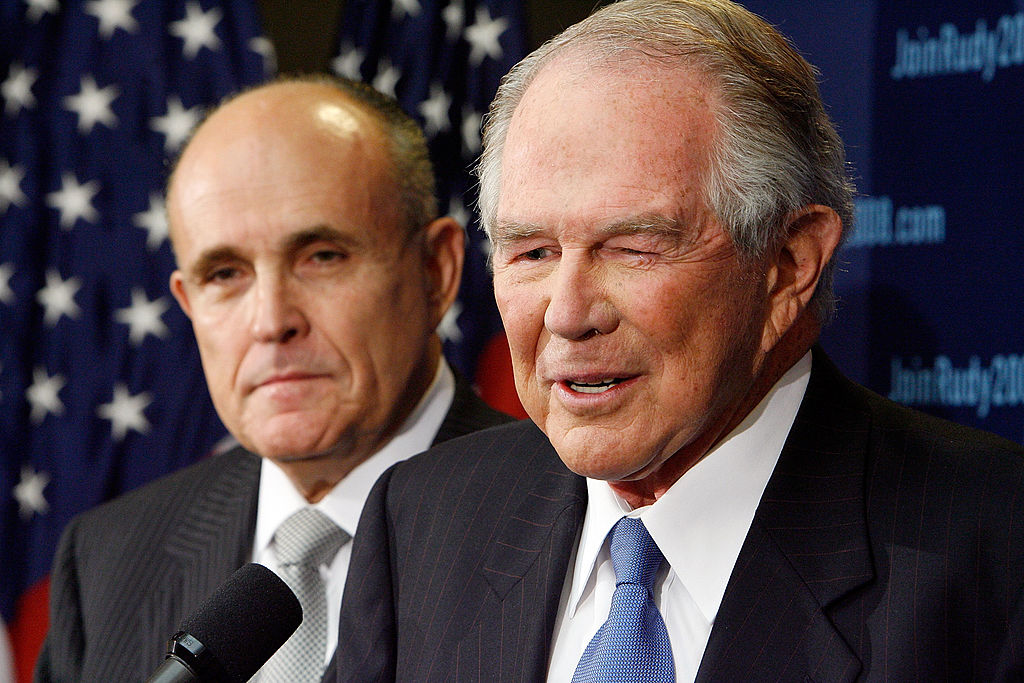Pat Robertson, who died this morning at his home in Virginia Beach, was a phony bastard. I learned this some decades ago at the racetrack.
I covered Maryland horse racing for the Washington Post for several years. I was the low man on the paper’s turf coverage totem pole and got paid just $75 a week. But any job that lets you hang out at a racetrack—let alone one where there was a betting window in the press box—is a great job. My main duty was writing up the featured race of the week on non-Preakness weeks. So there I was in the winner's circle at Laurel Park in July 1999 after a $50,000 race, the Walter Haight Handicap, trying to find connections to Tappat, the four-year-old gelding who’d swept past rival (and similarly gelded) Praise Heaven down the stretch to take the stake.
But no owner was around. I was told by the horse’s trainer, a nice chap named Thomas Greene, that the winning stable, listed in the racing program as Tega Farm, was simply “a Virginia Beach outfit.” I always figured the winner’s circle photo op was the main reason some folks with money lying around spend it on a horse, and something about the Tappat owner’s no-show struck me, to the point where I included Greene’s vague description in my race write-up.
Some months later, I was at the same track and heard up in the press box that Pat Robertson was spotted in the paddock. I went down to the barns and couldn’t find him, but I saw another Tega Farm horse among the entries in the program that day. I had a hunch that Robertson was behind the Virginia Beach outfit who also owned Tappat. But there was no mention of his dabbling in horse racing on his personal Web site or that for The 700 Club, his television show. And nobody with Tega Farm was willing to talk on the record about the mega preacher having a racing operation.
“I signed a disclosure form saying I wouldn’t talk about the owners of Tega,” a trainer for the stable named Earl “Abraham” Ola told me in 2001.
When I called Tega Farm, I couldn't even find out how many horses were in the stable. “I’m not at liberty to discuss that,” Karon Locher, listed as the business manager, told me.
But horse racing is a very regulated amusement. And when I contacted the track’s racing office, I learned that Robertson was indeed Tega Farm’s proprietor. Upon the delivery of this revelation, I remember thinking something along the lines of “I’ll be damned!”
Robertson was among the most outspoken and influential and obnoxious moralists in American history, and he was at the height of his powers at the time. He outlived his cultural relevance by a couple decades, so it might be hard for folks who didn’t witness the 1990s to understand how shocking and great it was to learn then that a guy who seemingly never got off his high horse was secretly worming his way into a pastime as stereotypically sinful as the sport of kings.
Another Virginia Beach outfit Robertson founded and controlled, the Christian Coalition, actively lobbied against all forms of legalized gambling during the early days of the internet. Robertson had initially formed the group to help his run for the presidency in 1988, but rather than dissolve it when the campaign for office flopped, he turned the Christian Coalition into a bully pulpit to tell all Americans how to live.
Just as I was finding out about his ownership of a racing stable, for example, the Christian Coalition website featured anti-gambling screeds and pushed for Congress to pass federal bans on gaming. Legalized gambling, according to the coalition’s paperwork, victimized ”our nation’s poor, our youth, and those who are gambling addicts.” (A helluva lot of racetrack patrons fit those demographics.) He lobbied for passage of legislation called the Internet Gambling Prohibition Act and the Amateur Sports Integrity Act, the latter of which “would ban gambling on amateur athletic events.”
But Robertson was hardly the first man of god with a do-as-I-say-not-as-I-do outlook. Robertson had pockets as deep as anybody in racing, but his undoing came because he wasn’t good at using the donated millions to pick winners. His worst bet came at the esteemed Keeneland auction in 2001, where he spent $520,000 to acquire an unraced two-year-old colt that he called Mr. Pat. Robertson showed he was indeed going for racing's top tier by immediately shipping his pricey young horse to Belmont Park and registering him to be eligible for the 2002 Triple Crown series.
But when the Kentucky Derby went off in May 2002, Mr. Pat hadn’t even entered his first race. Breathing problems caused by a throat disorder known as recurrent laryngeal neuropathy and other assorted injuries kept him in the barn. Robertson had vets perform throat surgery on Mr. Pat, which finally got him on the track, but the horse never lived up to his price tag.
Yet because of his flashy Keeneland bid, word about Robertson’s parimutuel pursuits began trickling out, and the blatant hypocrisy peeved some segment of the Christian right. Protests from his flock, combined with Mr. Pat’s flopping, led Robertson to publicly promise to get out of the racing game.
“I am sorry that my fondness for the performance of equine athletes has caused you an offense,” he wrote in a whiny post for his website in the spring of 2002. “Therefore, for your sake and the sake of others like you, I have set in motion the necessary plans to dispose of all of my thoroughbred racing and breeding stock between now and the breeding sale in Kentucky in November.”
Robertson was slow to deliver on his pledge. But by the end of 2003, Robertson had pawned Mr. Pat off on a small Pennsylvania racing farm for an undisclosed but surely tiny sum. He was out of the racing game.
And now he’s dead. RIP, you phony bastard.






